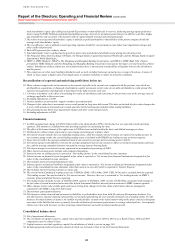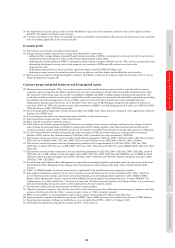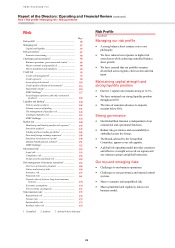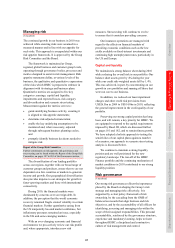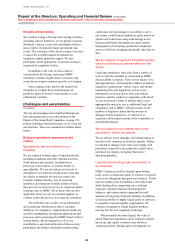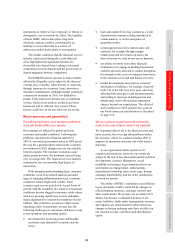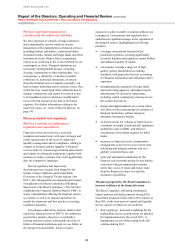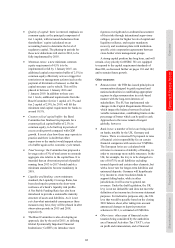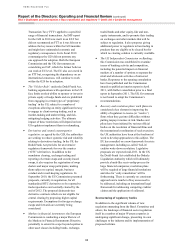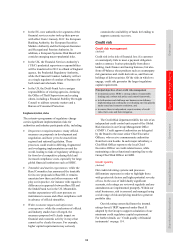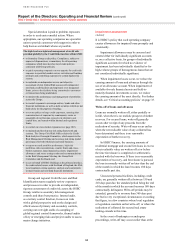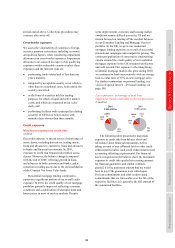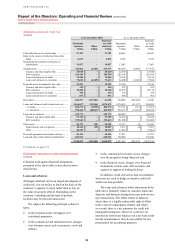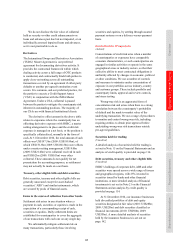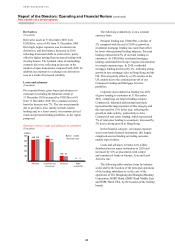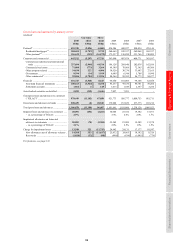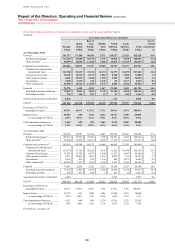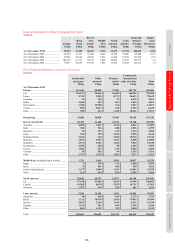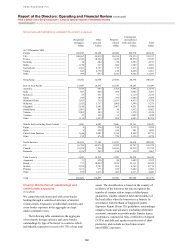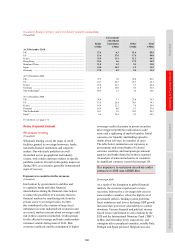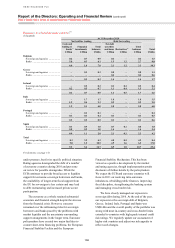HSBC 2010 Annual Report Download - page 96
Download and view the complete annual report
Please find page 96 of the 2010 HSBC annual report below. You can navigate through the pages in the report by either clicking on the pages listed below, or by using the keyword search tool below to find specific information within the annual report.
HSBC HOLDINGS PLC
Report of the Directors: Operating and Financial Review (continued)
Risk > Credit risk > Credit risk management / Credit exposure
94
Special attention is paid to problem exposures
in order to accelerate remedial action. Where
appropriate, our operating companies use specialist
units to provide customers with support in order to
help them avoid default wherever possible.
The high-level oversight and management of credit risk
provided globally by the Credit Risk function within GMO
• to formulate Group credit policy. Compliance, subject to
approved dispensations, is mandatory for all operating
companies which must develop local credit policies
consistent with Group policies;
• to guide operating companies on our appetite for credit risk
exposure to specified market sectors, activities and banking
products and controlling exposures to certain higher-risk
sectors;
• to undertake an independent review and objective
assessment of risk. Global Risk assesses all commercial
non-bank credit facilities and exposures over designated
limits, prior to the facilities being committed to customers
or transactions being undertaken;
• to monitor the performance and management of portfolios
across the Group;
• to control exposure to sovereign entities, banks and other
financial institutions, as well as debt securities which are not
held solely for the purpose of trading;
• to set our policy on large credit exposures, ensuring that
concentrations of exposure by counterparty, sector or
geography do not become excessive in relation to our
capital base, and remain within internal and regulatory
limits;
• to control our cross-border exposures (see page 102);
• to maintain and develop our risk rating framework and
systems. The Group Chief Risk Officer chairs the Credit
Risk Analytics Oversight Committee, which reports to the
Risk Management Meeting and oversees risk rating model
governance for both wholesale and retail business;
• to report on retail portfolio performance, high risk
portfolios, risk concentrations, country limits and cross-
border exposures, large impaired accounts, impairment
allowances and stress testing results and recommendations
to the Risk Management Meeting, the Group Risk
Committee and the Board; and
• to act on behalf of HSBC Holdings as the primary interface,
for credit-related issues, with the Bank of England, the FSA,
local regulators, rating agencies, analysts and counterparts
in major banks and non-bank financial institutions.
Group and regional Credit Review and Risk
Identification teams regularly review exposures
and processes in order to provide an independent,
rigorous assessment of credit risk across the HSBC
Group, reinforce secondary risk management
controls and share best practice. Internal audit,
as a tertiary control function, focuses on risks
with a global perspective and on the design and
effectiveness of primary and secondary controls,
carrying out oversight audits via sampling of
global/regional control frameworks, themed audits
of key or emerging risks and project audits to assess
major change initiatives.
Impairment assessment
(Audited)
It is HSBC’s policy that each operating company
creates allowances for impaired loans promptly and
consistently.
Impairment allowances may be assessed and
created either for individually significant accounts
or, on a collective basis, for groups of individually
significant accounts for which no evidence of
impairment has been individually identified or for
high-volume groups of homogeneous loans that are
not considered individually significant.
When impairment losses occur, we reduce the
carrying amount of loans and advances through the
use of an allowance account. When impairment of
available-for-sale financial assets and held-to-
maturity financial investments occurs, we reduce
the carrying amount of the asset directly. For further
details, see ‘Critical accounting policies’ on page 33.
Write-off of loans and advances
Loans are normally written off, either partially or
in full, when there is no realistic prospect of further
recovery. For secured loans, write-off generally
occurs after receipt of any proceeds from the
realisation of security. Write-off may occur earlier
when the net realisable value of any collateral has
been determined and there is no reasonable
expectation of further recovery.
In HSBC Finance, the carrying amounts of
residential mortgage and second lien loans in excess
of net realisable value are written off at or before
the time foreclosure is completed or settlement is
reached with the borrower. If there is no reasonable
expectation of recovery, and foreclosure is pursued,
the loan is normally written off no later than the end
of the month in which the loan becomes 180 days
contractually past due.
Unsecured personal facilities, including credit
cards, are generally written off at between 150 and
210 days past due, the standard period being the end
of the month in which the account becomes 180 days
contractually delinquent. Write-off periods may be
extended, generally to no more than 360 days past
due but in very exceptional circumstances exceeding
that figure, in a few countries where local regulation
or legislation constrain earlier write-off, or where the
realisation of collateral for secured real estate
lending extends to this time.
In the event of bankruptcy or analogous
proceedings, write-off may occur earlier than at the


